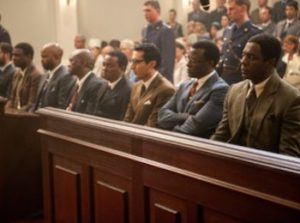
The Denfendants
*On this date in 1963, the Rivonia Trial in South Africa began. The Rivonia Trial led to the imprisonment of the accused, who were convicted of sabotage and sentenced to life at the Palace of Justice, Pretoria. Charges were:
· Recruiting persons for training in the preparation and use of explosives and guerrilla warfare for the purpose of violent revolution and committing acts of sabotage
· Conspiring to commit the aforementioned acts and to aid foreign military units when they invaded the Republic
· Acting in these ways to further the objectives of communism
· Soliciting and receiving money for these purposes from sympathizers in Uganda, Algeria, Ethiopia, Liberia, Nigeria, Tunisia, and elsewhere.
"Production requirements" for munitions for six months were sufficient, the prosecutor said in his opening address, to blow up a city the size of Johannesburg.
The Rivonia Trial took its name from Rivonia, the suburb of Johannesburg, where leaders had been arrested (and documents discovered) at Liliesleaf Farm, privately owned by Arthur Goldreich, on July 11, 1963. Various people and groups, including the African National Congress (ANC), had been using the farm as a hideout. Among others, Nelson Mandela had moved onto the farm in October 1961 and evaded security police while masquerading as a gardener and cook. The 11 accused were Nelson Mandela, Walter Sisulu, Govan Mbeki, Ahmed Kathrada, Raymond Mhlaba, Denis Goldberg, Elias Motsoaledi, Rusty Bernstein, Bob Hepple, Andrew Mlangeni, and James Kantor. Other key leaders were not at the farm during the arrests.
At the beginning of the defense proceedings, Mandela gave a three-hour speech from the defendant's dock, explaining and defending the ANC's key political positions. He justified the movement's decision and discussed in some detail the relationship between the ANC and the SACP, explaining that, while the two shared a commitment to action against the apartheid system, he was wedded to a model of constitutional democracy for South Africa (he singled out the British political model for praise), and supported a market economy rather than a communist economic model.
The speech is considered one of the founding moments of South African democracy. Mandela's closing words have been quoted extensively. They were reportedly speaking, looking the judge full in the eyes. In his statement, speaking in the dock of the court on April 20, 1964, he said: During my lifetime, I have dedicated my life to this struggle of the African people. I have fought against white domination, and I have fought against black domination. I have cherished the ideal of a democratic and free society in which all persons will live together in harmony and with equal opportunities. It is an ideal for which I hope to live for and to see realized. But, my Lord, if it needs to be, it is an ideal for which I am prepared to die.
The trial lasted until June 12, 1964. The arrest of the MK high command members resulted in them being sentenced to life imprisonment, others being arrested, and others going into exile. The trial was condemned by the United Nations Security Council and nations worldwide, leading to some international sanctions against the South African government.